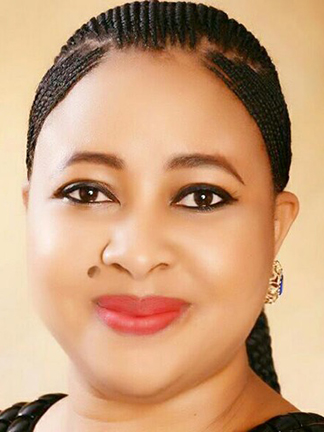By Karen Shih
Boosting immunization coverage rates and changing health systems in Nigeria

Growing up in southern Nigeria, Linda Arogundade, MS GHPM’11, admired daily the work her mom did in the community as a nurse, from immunizing children to counseling women on birth control methods.
“I decided even before I was 10 that I was going to be a doctor,” she says. “It would give me the opportunity to do even more.”
She realized during a stint in a rural community during medical school that she could further broaden her reach by expanding into public health.
“In developing countries like Nigeria where resources are scarce, the best way is going through public health to prevent diseases, to try and manage people’s behavior and promote healthy lifestyles,” she says. She put that into action during her year in the compulsory National Youth Service, where she was assigned to a local government clinic, as well as in her job with a health insurance company, where she learned about managed care.
But that wasn’t enough. “I needed the additional skills and training to do more,” she says.
That’s why Arogundade turned to Heller to study global health policy. Today, she constantly uses the skills she learned in classes on policy and practice change, health economics, planning and implementation, and monitoring and evaluation.
“When you get into the real world, you appreciate what Heller has given you,” she says. “At the time I thought, ‘I want to save the world! Who wants to do stakeholder analysis?’ But now that I’m practicing, I can see that without the policymakers on your side, you can’t implement whatever beautiful idea you have.”
She took a job with World Vision USA in Washington, D.C. after graduating from Heller, gaining a global perspective as she worked on HIV management and polio eradication in countries like India, South Sudan, Angola and Ethiopia. But ultimately, she knew she wanted to bring her skills back to Nigeria. She first worked for the Institute of Human Virology Nigeria and now serves as an Immunization Technical Consultant for the Johns Hopkins International Vaccine Access Center where she provides technical support to the National Emergency Routine Immunization Coordination Center (NERICC) in Nigeria. Her goal is to improve dire immunization rates in her home country by partnering with international organizations like the World Health Organization and the U.S. Centers for Disease Control to advise the Nigerian government. Her work ranges from capacity building for health workers to demand creation for primary health care services to making policy recommendations.
“Vaccines not only save lives but improve productivity and GDP,” she says. “If my child is sick, I’m going to lose money because I’ll be in the hospital, not making money, and also have to pay for treatment. If I immunize my child with just one shot, I will have prevented all of this.”
Arogundade says she’s recommended Heller to many of her friends in the health field, and several have followed her path.
“You get quality there,” she says. “It’s not too big, so you get one-on-one interactions with faculty.”
“A Heller MS degree gives you flexibility,” she says. “You can work in any part of the world, in developing or developed countries, and still make an impact. You can practically do anything you want to do and achieve the same goal of preventing diseases, protecting communities and helping people lead healthy lifestyles.”
